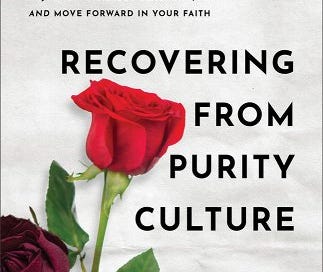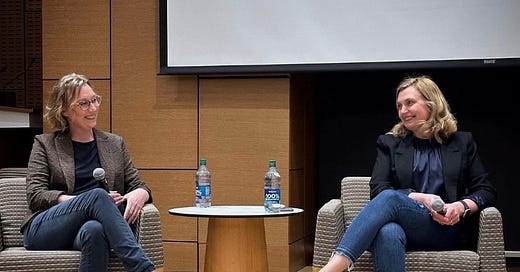
Thus far, several of President-elect Donald Trump’s political appointees have faced allegations of serious sexual misconduct or covering up abuse. Rep. Matt Gaetz withdrew after learning that CNN was going to reveal additional allegations, but Pete Hegseth (a member of a Doug Wilson-connected CREC church) and Robert Kennedy Jr. remain in the running, as do Elon Musk and Linda McMahon.
Have these allegations dampened enthusiasm among conservative evangelicals for his appointees? Not so much. Once again, we are reminded that sexual assault is not a deal breaker for the majority of conservative evangelicals.
In her new book Recovering from Purity Culture: Dismantle the Myths, Reject Shame-Based Sexuality, and Move Forward in Your Faith, Dr. Camden Morgante, a licensed clinical psychologist, explores connections between evangelical purity culture and rape culture.
Regardless of what happens on the national stage, it is critical to continue to expose teachings trapping women and children in harmful situations and enabling abusive and controlling behaviors to go unchecked.
To that end, I’m sharing a post below by Dr. Morgante where she reflects on her research and the stories of survivors in For Our Daughters.
Please consider picking up a copy of her new book, and maybe an extra one for a local church library.
Here’s Dr. Morgante:
The film For Our Daughters is a powerful documentary about the epidemic of sexual abuse in the evangelical church. The filmmakers focus on the ties between Christian nationalism, patriarchy, and sexual abuse scandals. But as I watched the courageous and inspiring women in For Our Daughters share their stories of abuse and the ways faith leaders were not only the perpetrators, but also complicit in the abuse, I couldn’t help but also see a connection between this rape culture and purity culture.
Just a few weeks after the documentary was released, my book, Recovering from Purity Culture, was published. In it, I focus mostly on the individual and personal experience of healing from shame, offering tools and exercises from my profession as a psychologist. But purity culture is both an individual problem and a systemic one. To fully dismantle purity culture and rebuild healthy faith and sexuality, there are systemic changes that also must be made. And that starts by recognizing and then plucking out the roots of patriarchy in ourselves and in our systems.
The Rise of Purity Culture
While the belief in sexual abstinence outside of marriage is a widely held one across cultures, religions, and time periods, modern purity culture peaked in the 1990s to 2000s. I define purity culture as the myths, messages, and cultural movement to persuade people to avoid any sexual activity prior to marriage, often using and resulting in shame and fear as a method of control. What most historians and experts agree on is that the purity movement was not biblical but a reaction to historical, political, and cultural events.
Each of these events snowballed into reactive events within Evangelical Christianity. The Moral Majority and the religious right were reactions to the feminist and sexual revolutions in the 1970s. Phyllis Schlafly’s STOP ERA was a reaction to the proposed need for protection against sex discrimination under the law. Abstinence-only education in schools in the 2000s was a reaction to the rise in teen pregnancy rates in the 1980s and facilitated by the rise in Christian Nationalism, which promoted Christian ideals in politics and public policy.
With cultural changes such as birth control, the feminist movement, and higher rates of women in the workforce, women began having more freedom on their own and became less dependent on men as a result. But if you could indoctrinate women to believe their sexuality is dangerous, to believe they are responsible for men’s sexual sin, that their virtue and desirability as partners is largely tied to their purity, and that their fathers need to control their dating choices, then you’ve developed another way to subordinate them—one that is so insidious, it comes under the cover of benefit and protection for women, one that is sanctified by its similarity to the Christian virtue of chastity. Fear and shame were the twin swords used in the battle against promiscuity and the war to control and subdue women. That is purity culture.
“The purity movement enabled evangelicals to reassert patriarchal authority in the face of economic, political, and social change.” –Kristin Kobes Du Mez, Jesus and John Wayne
What is Rape Culture?
Rape culture is the subsequent result of a purity culture that holds women responsible for men’s lust. While rape culture is part of our secular culture as well, many authors have astutely pointed out how evangelical purity culture can promote rape culture.[i] In fact, research reviewing Christian dating books revealed themes supportive of rape culture, such as the teaching that women are responsible for sexual violence perpetrated by men.[ii] We hear rape culture any time a woman is blamed, questioned, or held responsible for her sexual assault and an offender is given a free pass:
“Well, what was she wearing?”
“He’s a man; he couldn’t help himself!”
“She should have known better than to be alone with him.”
While shame is a common symptom after any trauma, purity culture adds the burden of religiously based shame after a sexual assault. The Gatekeepers Myth puts women in charge of managing sexual boundaries, so if an “indiscretion” (read: abuse) occurs, it must be the woman’s fault. The Damaged Goods Myth of purity culture declares that you are soiled and broken if you have premarital sex or even if you are abused at the hands of someone else. Sexual abuse is always spiritual abuse because trauma of any kind cuts to the core of who we are as embodied beings. It dishonors the image of God in us.
Many survivors, such as those in For Our Daughters, do not initially report their sexual assault because they feel broken or to blame, or they worry about others’ reactions. As Jules Woodson shares, “You don’t just move on after trauma. And when society and the church act like it didn't happen [and] dispose of the victim, then it’s retraumatizing all over again.”
Sadly, the response of a survivor’s family or religious community can leave searing pain that outlasts the effects of the assault itself. What should be a sanctuary from trauma and a safe haven from blame is often the very place women feel the most judged and shamed.
Rape culture gives perpetrators (almost always men) a free pass. This absolves men of responsibility for their crimes, allowing them to maintain positions of power over women. Rachael Denhollander states, “When you’ve created a culture where manhood and womanhood is defined by submission and authority, you’ve created a culture in which authority goes unchecked and easily becomes abuse. And so men think they can get away with abuse because they actually can get away with it.”
And this is because of patriarchy.
Patriarchy
In Jesus and John Wayne, Du Mez quotes a former member of a church planting group who blames “the combination of patriarchal gender roles, purity culture, and authoritarian clergy” in “creating an environment where women and children–especially girls–were ‘uniquely vulnerable to abuse’”.
Purity culture contains elements of rape culture by blaming women but exonerating men for sexual sin or violations. It attempts to control sexuality (particularly women’s) through myths and false promises about premarital sex. Underlying both of these cultures is patriarchy. And patriarchy, like purity culture and rape culture, is not biblical.
“Patriarchy wasn’t what God wanted; patriarchy was a result of human sin.” –Dr. Beth Allison Barr, The Making of Biblical Womanhood
We cannot heal from purity culture and eradicate rape culture while simultaneously promoting patriarchy. We cannot support a culture that subordinates women to men. We cannot subscribe to a belief system that puts men in charge of women’s sexuality, yet blames and holds women responsible for men’s sexual sin.
Instead of blame and forced forgiveness and “reconcilitation”, what a survivor of sexual abuse needs to hear is that you are not to blame for what was done to you. The shame and guilt do not belong to you; they belong to the perpetrator(s) and the systems that allowed the abuse to occur, maintained it, and hid it. There is no place for a culture like this in the Church. And we must continue to speak out against it, no matter the cost.
—
Portions of this essay were adapted from Camden Morgante, Recovering from Purity Culture: Dismantle the Myths, Reject Shame-Based Sexuality, and Move Forward in Your Faith, Baker Books, a division of Baker Publishing Group, 2024. Used by permission.
Bio: Dr. Camden Morgante is a licensed clinical psychologist who owns a private therapy practice. She is a writer, speaker, and coach on purity culture recovery, egalitarianism, and faith reconstruction. Her first book, Recovering from Purity Culture, released this year. Dr. Camden lives in Knoxville, Tennessee with her husband and their daughter and son. Learn more about Camden on her website, www.drcamden.com and Substack, Walking the Middle Path.
[i] See Emily Joy Allison, #ChurchToo: How Purity Culture Upholds Abuse and How to Find Healing; Mary E. DeMuth, We Too: How the Church Can Respond Redemptively to the Sexual Abuse Crisis; Ruth Everhart, The #MeToo Reckoning: Facing the Church's Complicity in Sexual Abuse and Misconduct; and the work of Dr. Diane Langberg.
[ii] See K. R. Klement and B. J. Sagarin, “Nobody Wants to Date a Whore: Rape-Supportive Messages in Women-Directed Christian Dating Books,” Sexuality & Culture 21 (2014): 205–23; and K. R. Klement, B. J. Sagarin, and J. J. Skowronski, “The One Ring Model: Rape Culture Beliefs Are Linked to Purity Culture Beliefs,” Sexuality & Culture 26 (2002): 2070–2106.
I had a wonderful time last week in Georgia meeting so many fabulous people, and later in the week at Georgetown and GWU, where I was participated on a panel moderated by NPR’s Michel Martin, who interviewed me a few months ago on Project 2025.
Speaking of Project 2025, despite Trump’s assurances to the contrary, it is very much in the mix as he prepares for his second administration. Shocking, I know. For a refresher, here’s the interview with Martin:
Before I go, a reminder that we’ll be holding an Election Postmortem at Notre Dame on Dec. 7. It’s free and open to the public and it’s an event designed for conversation and collaboration. We have a really stellar lineup of speakers—scholars and practitioners—and we’d love to have you join us for the day.















Thanks Kristin! This is another powerful entry.
Thank you Kristin